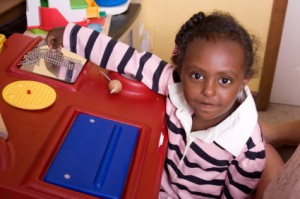 Potty training is one of the most frequent struggles parents have. It starts with “When do I know my child is ready?” And “How do I start potty training?” “What do I do when they don’t seem to understand?” These are all common questions I get from my families. Some of you know that I previously worked exclusively with 0-3 year olds (in their homes), so as you can imagine potty training took up most of my day. The following are some “tips” and “tricks” I have acquired in my figurative bag over the years that my families tend to like (not to be confused with therapeutic recommendations).  The development of sensory processing begins in the womb and continues throughout our lives. Every moment of every day, we are constantly experiencing sensory information from our environment whether we are aware of it or not. From the texture of the fabric in our clothing, to the sound of the cars driving past a window, to the brightness of the lights overhead, or a fan whirring in the background, our bodies are constantly taking in information from the world around us. Our brains take that sensory information and process it, allowing us to create thoughts and actions that influence how we live our daily lives.  Speech-Language Therapy teaches children and adolescents how to communicate effectively, solve problems and make decisions independently. It provides the necessary tools for bright and motivated individuals to engage in meaningful social relationships and complete a fulfilling educational and life experience. Speech-language therapists are medical professionals who are trained to identify and treat issues with feeding and swallowing which often go undetected and can be a serious threat to an individual’s health. These issues can include a dislike of foods or food textures or inability to properly swallow food and drinks. Difficulties in one or more of these areas include risk of pneumonia, malnutrition and dehydration. Swallowing issues can also affect babies. Infants who have difficulty latching, breast feeding, drinking from a bottle, weak lip muscles, difficulty transitioning from a bottle to soft foods, difficulty chewing, and choking/coughing due to eating can also benefit from therapy.  An occupational therapist is a medical professional who evaluates and treats children and adults who have difficulty participating in “occupations” or meaningful activities relevant to their daily lives. A common misconception is that occupational therapy is specifically for adults as children do not have “occupations,” but a child’s main job is playing and learning. An occupational therapist evaluates a child’s skills for playing, school performance, and daily activities and compares them with what is developmentally appropriate for that age group.
|
AuthorAmy Grant is a licensed Speech-Language Pathologist, Certified Autism Specialist and Clinic Director of Therapy Center of Buda. Family Corner Blog
Learn parenting tips, access credible resources on disabilities and find out how to bring therapy techniques home with you to make parenting a little bit easier. Legal Disclaimer Categories
All
SubscribeArchives
July 2024
|




 RSS Feed
RSS Feed
